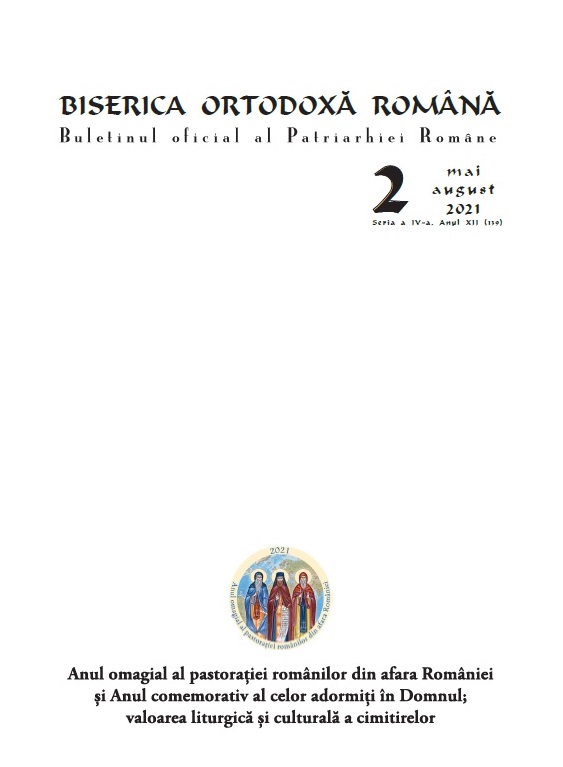Hramul istoric al Catedralei Patriarhale din București
The historical patronal feast of the Patriarchal Cathedral in Bucharest
Author(s): Vasile-Robert Nechifor, Gabriel RădășanuSubject(s): History, Sociology, Recent History (1900 till today), Theology and Religion
Published by: Editura Institutului Biblic și de Misiune Ortodoxă
Keywords: Patriarchal Cathedral; historical patronal feast; Holy Liturgy; awards for the national contest of catechism;
Summary/Abstract: On the historical patronal feast of the Patriarchal Cathedral, 21 May 2021, the Patriarch of Romania alongside eight bishops – members of the Holy Synod, celebrated the Holy Liturgy in the outdoors altar on the Hill of Joy. In his sermon, His Beatitude eulogized Holy Emperor Constantine, whom he described as a shepherd of the Church, and his mother Saint Helena, who greatly contributed to the welfare of Christians within the Roman Empire. His Beatitude took as a starting point for his address the troparion of the feast, pointing out that the military victories obtained by the son of Constantius Chlorus were granted by the power of God and under the protection of the Holy Cross, and that Emperor Constantine received his calling directly from God, like the Holy Apostle Paul had. Consequently, the Church does not honour Saint Constantine alongside kings or emperors, but alongside apostles and hierarchs. The Pauline Epistle read out for this feast describes Saint Paul’s conversion, while the day’s pericope is the one usually read out for feasts dedicated to hierarchs, to bishops. Within the Church, bishops were consecrated as spiritual shepherds of individuals and communities; but because Constantine demonstrated fatherly love for all Christians, loved the Church of Christ and worked for its unity, he was termed a bishop outside the Church, explained His Beatitude Patriarch Daniel. He did not confine himself to freeing Christians from perseccutions, but took further steps which actively supported the Church. Since the bishops were entitled to pass sentences in court trials, Christians began to receive important positions, because their attitude was fair and honest. Saint Constantine the Great promulgated new laws which abolished torture, banned abortions or infanticide, and supported impoverished Christian families (…) He gave a Christian character to the laws of the formerly pagan Roman Empire, began the construction of many churches, among the most significant ones: „Saint John Lateran” and „Saint Peter’s Basilica” in Vatican. Following the advice of his mother Helena, he offered help, in various ways, to the Christians across the Empire. Some of the imperial edifices, or great halls, were donated to the Church for the benefit of Christian communities in urgent need for liturgical space. Prompted by his concern for the unity of the Church and of the Empire, Constantine organized the first Ecumenical Council (325 AD) which he presided. He addressed the attendees standing, rather than sitting on the throne as emperors would. He did so out of respect for the bishops who had suffered persecutions. His Beatitude highlighted the popularity enjoyed by the Holy Emperor Constantine and Empress Helena among Romanians, and the reasons for this veneration. The emperor had a bridge built across the Danube, at Sucidava, then supported the Christianization of Banat, Oltenia and Wallachia. He Christianized not only the Getes and the Dacians, but also the Goths who had arrived in the territory. (…) Saint Constantine had numerous churches built, and greatly promoted Eastern Christianity, which is why he was titled «Dacicus Maximus». His Beatitude also reminded that the first founder of the Patriarchal Cathedral was prince Constantin Șerban Basarab, who dedicated it to the Holy Emperor Constantine and Empress Helena. Patriarch Daniel extended his well-wishes to the almost 2 million Romanians bearing the names of Saints Constantine and Helena. At the end of the service, His Beatitude Patriarch Daniel awarded the Order „Maria Brâncoveanu Cross” to Ms Alis Grasu, manager of București-Ilfov Ambulance Service, and also declared the winner in the Bucharest Archdiocese of the National Contest of Catechism „The Church – family of the Romanians everywhere”.
Journal: Revista Biserica Ortodoxă Română, Buletinul oficial al Patriarhiei Române
- Issue Year: 2021
- Issue No: 2
- Page Range: 56-67
- Page Count: 12
- Language: Romanian

